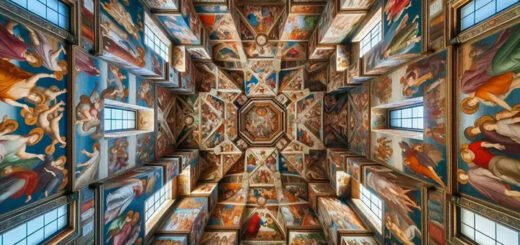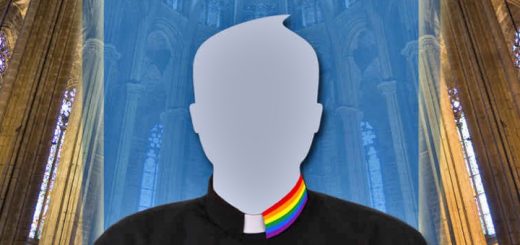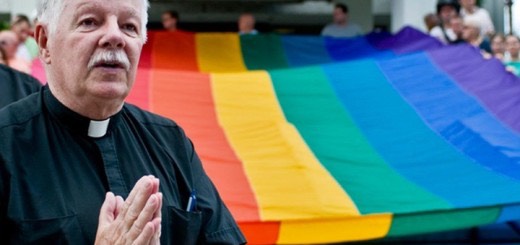The Catholic Church and the gays. But why are there so many homosexual priests?
Article by Andrew Sullivan published on the fortnightly website New York (United States) on January 21, 2019, fifth part, freely translated by Giacomo Tessaro
But why are there many gay priests? It is worth noting that the connection between homosexuality and spirituality is not at all prerogative of Catholicism. Some evolutionary psychologists have found an ancient connection between gays and tribal shamanism.
Carl Gustav Jung identified the archetypal gifts of the homosexual person: "Great friendship, which often creates ties of surprising tenderness between men"; talent for teaching, aesthetics and tradition ("Being conservatives in the best sense of the word and loving the values of the past"); "Rich religious feelings, which contribute to making real spiritualis ecclesia; spiritual receptivity, which makes sensitive to revelation".
Questioning the gay priests, I heard a quantity of answers. Some told me about how the feeling of being out of place when they were children and adolescents made them more sensitive to the needs of the marginalized: "If you are an out of place person, you can help those in the same situation as you, and welcome it". One simply said "We understand suffering"; Another spoke of the sense of comfort in belonging to a religious community.
Still others talk about the attraction for the rituals of the Church: "Catholicism was different, I was different ... I had a strong mystical trend" explains a priest. Catholicism is a faith that finds its center in the mass, in which the body, the soul and the senses are as important as the mind. In a sense, mass is one performance And, without wanting to indulge too much in stereotypes, there is something in the liturgy, ritual, music and staging that attracts a certain category of gay. The people who belong to you (they can also be found among artists and scholars) are very attentive to details, ironing with regard to the rules and in love with tradition and beauty. In many respects, the ancient and elaborate sung mass, composed of incense and processions, clothes with coded colors, complex from a liturgical point of view, specifies in the music, in the choir and in the organ, in practice a theatrical show, is Obviously, at least in part, a creation of the gay priests, whose sexuality has been sublimated in order to become an integral and essential part of the Catholic cult.
Then there is the very widespread experience of the gay child/teenager, raised in Catholicism, who turns to God to find an answer to his different being, far from the norm. In this situation it is obliged to develop deeper meditations than those of most of its peers, a strong spirit of observation and early spirituality, which will hardly abandon it. I too was like this as a young man. The first person with whom I came out was God, with a silent prayer made while I went to do communion. I was doing the cleric, I knew how to handle an brass turbule full of incense, at the age of eleven I knew how to discuss the subtleties of transubstantiation and I thought I was suited to the priesthood (but in the end I concluded not to be quite worthy). Like many lonely Catholic boys, I saw a model in Jesus: single, sensitive, was not part of a family, had been marginalized and persecuted, but in the end he had won and was alive over the centuries.
But there are other reasons, very not very healthy, so many gays choose the priesthood. The first is celibacy. Over the past centuries, young Catholic gays, if they wanted to avoid social ostracism or the insistent questions about their lack of interest in girls and women, had the priesthood escapade.
(Once a priest told me that for a long time the most powerful push to the vocation were the mothers who, sensing that one of their children was that type of person "That he will never get married", encouraged them to enter the Church to save the social prestige of the family.) It is a mechanism in activities still today, even if less than in the past. Even a strong lack of self -esteem, in part due to Catholic homophobia, is a factor that leads to the priesthood as a means of repressing or taking care of its sexuality in some way.
"Before even adolescence, we understand that that thing is an abomination, so we turn to what the Church teaches and we end up saying 'fill me with your words and become you. I will become a magisterial personality'" A priest says, which I will call Father John.
With "Magisterial personality" He means a person who embodies the magisterium, the official teaching of the Church: "In other words, I stopped being me. I suspect that it is precisely for this reason that many of these people end up being frighteningly gray and impersonal: at some point in their lives they decided to be no longer themselves". I have seen this thing in many priests: unable to be themselves, they become simulacra, symbols, and in the end even caricatures or personified masks.
Often this unconscious struggle runs out. It is never easy to give up being yourself. Some try to remedy by taking attitudes from an extravagant checca, others sink into depression, in which alcohol and drugs peep out: "My God, when in 2010 I returned to the Church I could not believe how obscesis those priests had become obscesis. They were so athletic as young people" Father Andrew says. Another priest told me "I had buried very deeply [my homosexuality]. Then I had a collapse: it was one of those moments when you would like to do something with a friend. One evening, when I went from here, I understood that I wanted at all costs to have a relationship with that man. Then I started to deflate. I didn't want to be that person, I didn't be me".
Others, more aware and cynical, know that you can make a career with all this falsehood. It is easy to understand how, since the thirteenth century, gays have secretly found in the Church, and only in the Church, a source of prestige and power. Marginalized by the company, in the Church they could become councilors of the monarchs, forgive the sins of others, have a fixed income, enjoy enormous privileges and be treated always and everywhere with respect. Everything was suppressed, questions were not asked in the seminars and counseling psychological did not exist (and even today they are rare). Many wounded and frightened men became priests, and certain mechanisms began to emerge.
One of these, as we have seen, is to implement your sexual tendencies in a deviated way. Putting the sexual abuse and gay priests in the same bundle, as many do impulse today, is a grotesque defamation addressed to the vast majority of them, which has never contemplated similar crimes, and which is indeed horrified: they are the classic expiatory goats. At the same time, completely exceeding the question abuse from that of gay priests means deliberately ignoring an unpleasant reality. Pedophilia is a separate category [it is a paraphilia, a so -called sexual "deviance", ndt], is not part of sexual orientation, but many of the abuses of minor males and young men, as well as confreres, derive from a terribly deviated homosexuality; About a quarter of the known cases concerns victims between 15 and 17 years old.
The impact of all this at the end of the twentieth century was extraordinary, but with the hindsight it was predictable. If you do not come to terms honestly with your sexuality, sexuality will demand its denied space. If you stand up an institution lined with repressed men without love for themselves, and its foundations are secret and complete obedience to superiors, you have practically created a machine that will churn out discomfort and abuse.
The horrendous reality is that we will never know the extension of abuses in past centuries and what still happens today, especially in those parts of the world, such as Africa and Latin America, where sometimes it is still taboo to pour into the affairs of the Church.
Another of these mechanisms is internalized homophobia: what you hate yourself, but you cannot face, scrutinizes it and punish it in others. It is a fact that many of the most homophobic bishops and cardinals have been and are gay. The most powerful American cardinal of the twentieth century, the Archbishop of New York Francis Spellman, who died in 1967, for years had a very active gay sex life despite being one of the most rigid orthodoxy guard dogs. Monsignor Tony Anatrella, an expert in reparative therapies very listened to in the Vatican, has recently been suspended for sexual abuse on men. The Scottish cardinal Keith O'Brien defined homosexuality "Moral degradation" and homosexual marriage "madness", but was forced to resign and abandon the country after being accused of sexual abuse on four priests.
The Australian cardinal George Pell, ultraconservator and anti-gay, has recently been found guilty of abuses on minors. Marcial Maciel, the founder of the legionaries of Christ, a sect of an enormously influential time, of extreme right and anti-gay, has sexually abused in countless men, women and children. The leader of Church militant, a man obsessed with gay priests, he is a "ex -gay" himself. Here is a good rule: the bishops and cardinals obsessed with the homosexual question often prove to be gay; Those who are more moderate tend to be straight.
Benedict XVI spoke of himself as a library mouse, not very brought for sport. His caressing speech is certainly effeminate: he was constantly seen in the company of his fiery private secretary, Father Georg Gänswein; He went around patient with extravagant clothes, such as Hermellini and red shoes made to measure. He is a theologian dominated by the obsessive desire to beat any minimal deviation from orthodoxy, who defined gays "Objectively disordered" and brought to "An intrinsic evil moral"; After having banned them from the seminars, he called them “una delle miserie della Chiesa”. Suggesting some kinds of connection between all these aspects of a holy person, celibate and sensitive means being accused of making disgusting insinuations, for the reason that many bishops still cannot consider homosexuality a question of love and identity, but only of acts and sexual desire. By lighting everything that does not work at the top of the Church, we can show how naked these unjewelled emperors are.
There is obviously a further level of complexity in the narrative of gay priests: generations. Those who are 70-80 years old today grew up in a different world, in which the hiding place was automatic and only the remote hypothesis of discussing this theme was scandalous. A priest described me that generation as follows: "They were so hidden that they seemed to live in Narnia".
Perhaps they are not even aware that they are gay, but they have fallen in their trenches in panic in the face of the modern review of homosexual love and sex as distinct from procreation. Those who have been 50-60 years old today are generally much more aware, and much better accepted by the family and other Catholics. This difference between generations is the origin of many of the conflicts in the high spheres of the Church.






